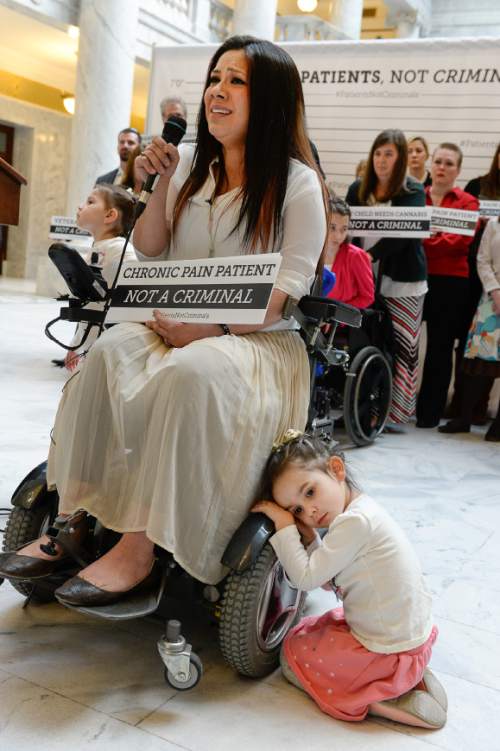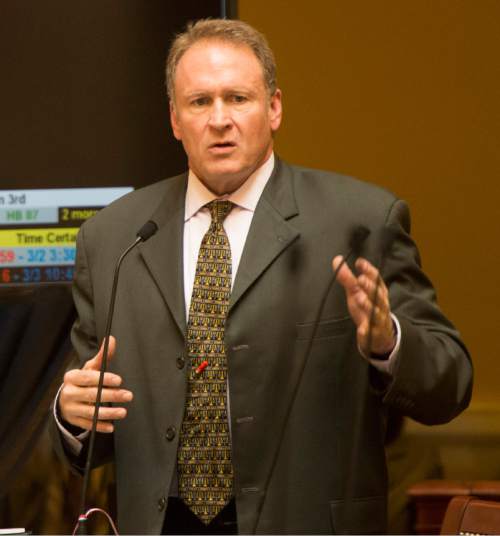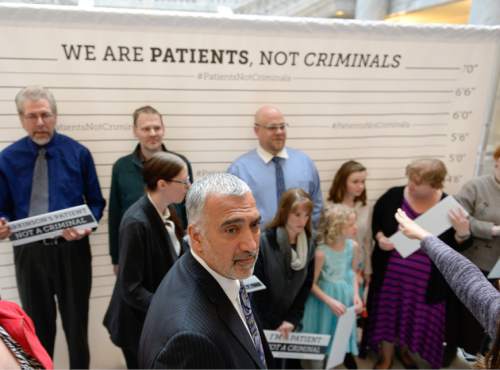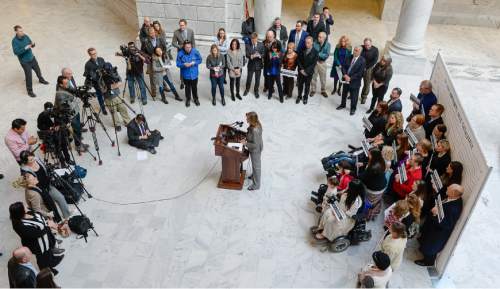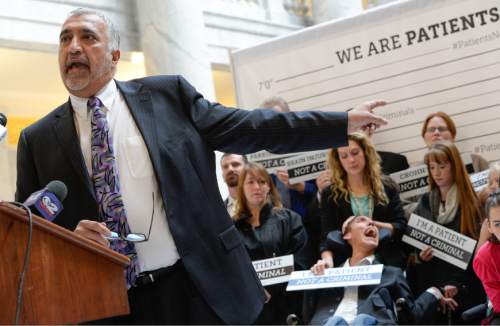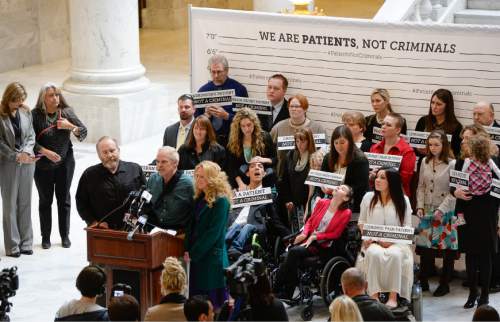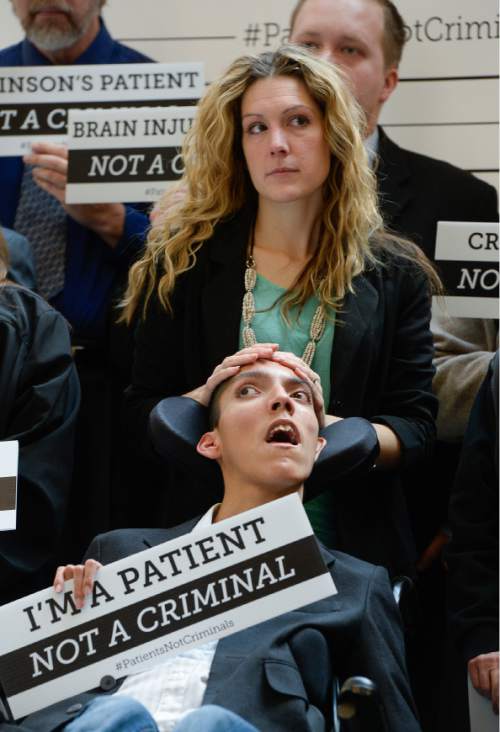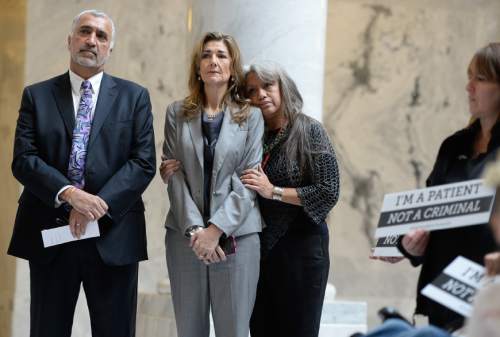This is an archived article that was published on sltrib.com in 2016, and information in the article may be outdated. It is provided only for personal research purposes and may not be reprinted.
Just in her teens, Maddie Campbell's body was turning against her, her muscles contracting involuntarily and making it impossible for her to walk more than short distances. Seizures were common.
Her sister, Victoria, died a year ago from a rare genetic illness, and neurologists were helpless to do anything beyond trying to stave off her deterioration when friends of Campbell's parents from California suggested — strongly — that Maddie try medical marijuana oils.
Within 24 hours, the seizures stopped, said her father, Aaron Campbell. Within three days, the muscle contractions ceased, making it possible for her to walk. Last week, after 18 months on the oil, Maddie's balance and muscle control had returned enough that she no longer needed braces on her legs or assistance with walking.
"If anybody goes through what I have gone through … they should try the medical marijuana because it's life-changing," said the 16-year-old. "It helps you with your thoughts, your walking stability. It's just helped me so much."
Maddie was one of a few dozen Utahns suffering from various illnesses who gathered Wednesday at the Capitol Rotunda, holding signs saying, "I'm a patient, not a criminal." They contend medical marijuana has helped with their illnesses and are calling on legislators to change Utah law to make it possible for them to use the drug without being considered lawbreakers.
Salt Lake County District Attorney Sim Gill joined the refrain, saying those gathered in the Capitol were not the people the state should be forcing him to prosecute.
"They are the faces and souls and hearts which we are criminalizing as a result of a failed drug policy," he said.
"I will prosecute whoever you want me to prosecute, and I will put in jail whoever you want," Gill said. "But we all have a role to play when it comes to public policy, and I can tell you, from where I stand, these are not the faces of criminals and these are not the people I want to be prosecuting."
Gill said when cases involving medical marijuana patients come across his desk, he is obligated to file charges, but his office will use its discretion to find a plea deal that is more lenient. That, however, "creates justice by geography," where people will get different treatment based on the leniency of the prosecutor, not the act they committed.
Those cases are only going to become more common, with 23 states having enacted laws legalizing medical marijuana, Gill said. It's time, he added, for Utah to do the same.
The patients assembled Wednesday to support a new bill, sponsored by Sen. Mark Madsen, that seeks to refine legislation the Saratoga Springs Republican pushed last year, when it fell one vote short of passing the Senate.
The new measure would create a regimen of regulation and licensing for the cultivation, processing and distribution of marijuana plants and use of extracts containing THC, the active ingredient in the plant.
Madsen's bill is wider than one sponsored by Rep. Brad Daw, R-Orem, and Sen. Evan Vickers, R-Cedar City, which would allow the use of cannabis plant extracts — without THC — for a narrower list of diseases.
Aaron Campbell said the bill backed by Daw, who is his representative, would do nothing to help Maddie, both because it bars use by children and bans extracts having THC, like the kind Maddie has used to treat her metachromatic leukodystrophy.
"We know what works for us, and we've documented it," Campbell said. "We're here because when I read [Daw's] bill, I was shocked, because his commitment to help my daughter, he's totally backtracked on his promise. … Madsen's bill, for some people, might be too much, but Brad Daw's does not help people in they way that they need."
Daw said the bill he and Vickers are sponsoring was crafted with input from doctors, law enforcement, the state's licensing division and others; the consensus was to take a "more cautionary step."
"A lot of those things [THC and access for minors] might well happen in the future, but when I talk to doctors and scientists — not activists — and get their take on it, they're saying ... there's a lot of anecdotal stuff out there, but there isn't a lot of really good research in the United States," he said. "So rather than jump in and cause who-knows-how-many problems, we'd rather take a slower step and say, 'OK, let's see how this works.' "
In direct response to Campbell's criticism, Daw said he wasn't the one who decided to limit access to adults, but it was what he thought could pass.
"I'm moving the ball down the field, maybe not as far as it needs to go, to try to help those who would be helped by this."
Allen Larsen is a retired police officer who worked for the state as an undercover narcotics agent and "bought and sold a lot of drugs." Now Larsen has Crohn's disease and nine months ago began traveling to Oregon to buy cannabis to help with his treatment.
In addition to helping with his symptoms, it has eased his arthritis and allowed him to stop taking Xanax.
"One thing I'd like to say as a police officer and as a paramedic: I never found anybody overdosed on cannabis," he said. "I found them overdosing on other medications and other drugs."
Enedina Stanger suffers from Ehlers-Danlos syndrome, which attacks the collagen that holds her bones in place.
She said, as a result of her disease, both legs have been dislocated, as have her kneecaps and the bones in her shins. Her rib cage is also shifting.
To treat her pain, she turned to marijuana and was arrested and booked when she was caught with the drug.
She and her family have since moved to Fruita, Colo., so she can use the drug legally.
"The pain is excruciating. I promise you that going to Colorado and using Cannabis doesn't free me from the pain I feel every single day," she said. But her children are also hurting at having to leave their home and their grandparents. "There is a pain they're suffering now that is completely at the hands of the politicians and the state of Utah."
Madsen's new bill would allow patients diagnosed with a "qualifying illness" to get permission from the state Health Department to use medical cannabis. The department would also license a limited number of dispensaries.
The Agriculture Department would license and monitor cultivation and processing facilities, as well as an independent testing lab.
The plants would be tracked with electronic tags from the time they're planted to the time they're sold. Parents who got a cannabis card for their children could not have the kids removed from their home or be discriminated against in custody disputes or child-welfare cases just because they are giving their children marijuana. People with cannabis metabolite in their system could cite their medical marijuana card as a defense against the crime.
Twitter: @RobertGehrke


